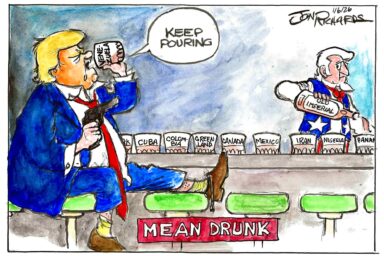A Kingdom on Trial: Could a Lawsuit Shed Light on Saudi Participation in 9/11?
More than 100 million Americans are too young to remember 9/11. But when Saudi Arabia goes on trial, that day’s events could soon take center stage again.
|
Listen To This Story
|
While the events of 9/11 are seared into the memories of anybody who was elementary school-aged or older in 2001, more than one-third of Americans are now under the age of 30, which means that they have no (or a very limited) recollection of the terrorist attacks on New York City and Washington, DC.
And that might make it difficult for them to comprehend the significance of this seminal event, the blow to the national psyche, and how the US was drawn into the “war on terror,” which cost thousands more American lives (along with nearly a million others), and turned us into a darker, less trusting, more fear-based nation.
But younger people really should know what led to 9/11, who was responsible, what came next, and why they are saddled with a multitrillion-dollar bill for the conflicts in Afghanistan and Iraq.
There’s just one problem: We still don’t know the full story.
Even though the attacks have been thoroughly investigated, there remains a gaping hole in our understanding of what happened — specifically, the role of Saudi Arabia. No matter whether a Republican or a Democrat occupied the White House, the US has shown little appetite for answering the question of whether the Saudi government, or members of the royal family, were involved.
And that is putting it nicely.
For years, the US government has resisted the release of information that could shed light on the ties between the hijackers, most of whom hailed from Saudi Arabia, and agents of the kingdom.
The special relationship between the countries, based on oil and American efforts to keep the royal family in power so it won’t be replaced with radical Islamists, has literally allowed the Saudis to get away with murder, as in the case of journalist Jamal Khashoggi.
However, if it were ever to be revealed that the Saudi government was involved in any way in 9/11, that relationship would end.
And since that is not out of the realm of possibilities, the US government hasn’t been looking all that hard.
WhoWhatWhy, on the other hand, has.
Led by founder Russ Baker, we have covered various aspects of this story, including those that mainstream news outlets have stayed away from. For example, you can read our interview with author and journalist Robbyn Swan here or listen to our podcast discussion with the former intelligence official Bill Binney. You can find more of our coverage on the Saudi Arabia connection here.
And now, just in time for the 24th anniversary of the attack, it looks as though a lawsuit could help illuminate a part of the story.
Late last month, US District Court Judge George Daniels rejected Saudi Arabia’s latest effort to dismiss a lawsuit that alleges the kingdom “intentionally participated, conspired, sponsored, aided and abetted, or materially supported Al Qaeda in the runup to the 9/11 attacks.”
The ruling means that this case — which centers around two Saudi nationals (with whom WhoWhatWhy readers are familiar) who were in contact with some of the hijackers when they arrived in the US — can go to trial.
And when it does, we will of course keep an eye on it for you.




